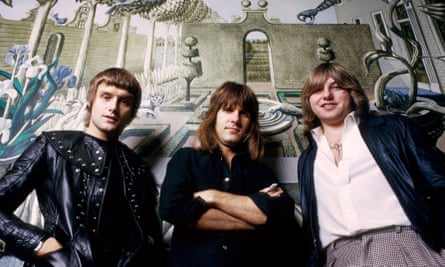Greg Lake, who has died of cancer aged 69, first rose to fame with a brief stint in King Crimson before achieving colossal success with Emerson, Lake & Palmer during the 1970s. Lake was one of the key figures in the creation of progressive rock, and had no time for critics who said that the music was ludicrously overblown. “I know people think we’re pretentious, but it’s really a product of sophistication,” he said in 1973. “Anything that makes demands on the listener could be called pretentious ... but those who are really into it want something more satisfying.”
Comprising Lake on bass guitar alongside the keyboards player Keith Emerson and the drummer Carl Palmer, ELP played their debut gig in Plymouth on 23 August 1970, and six days later announced themselves as a new force on Planet Rock with a devastating performance at the Isle of Wight festival, where the bill also featured Jimi Hendrix, the Doors, the Who and Joni Mitchell. At the time they were in the middle of recording their debut album, called merely Emerson, Lake & Palmer.
The group’s momentum was unstoppable. When the album was released that November, it reached No 4 in Britain and 18 on America’s Billboard 200, and gave them a US Top 50 hit single with the atypically poppy Lucky Man, a song written by Lake when he was 12. It gave Lake the title for his 2012 autobiography.
The follow-up album, Tarkus (1971), topped the British charts and reached No 9 on the Billboard 200, its multi-part, 20-minute title song giving notice of the band’s bold musical ambitions. They burnished their reputation further with a live recording, Pictures at an Exhibition (1971). Trilogy (1972) and Brain Salad Surgery (1973) both stormed the international charts (the latter was the first release on the group’s Manticore label, which Lake had been instrumental in setting up).

The group undertook a packed schedule of touring in America in 1973 and 1974, and their live shows became renowned for both technological wizardry and the group’s musical expertise. Hoedown, a track from Trilogy that adapted part of Aaron Copland’s ballet Rodeo, became a stage favourite. Milestone events included the band performing to a quarter of a million people at the California Jam festival, and the live shows were preserved on the triple album Welcome Back My Friends to the Show That Never Ends (1974), a Top 10 album in both Britain and the US.
Lake was born in Bournemouth, and grew up in a house he described as an “asbestos prefab”. His father was an engineer and his mother a housewife, and it was she who gave Greg his first guitar for his 12th birthday. He began taking lessons with a local guitar teacher, Don Strike, and became friendly with a fellow pupil, Robert Fripp. His early idols included Elvis Presley, the jazz guitarist Django Reinhardt and Hank Marvin of the Shadows, but he was also fascinated by classical composers including Copland and Prokofiev.
Lake took a college course with the aim of becoming a draughtsman, but he spent his nights performing with local groups such as the Shame and the Gods and his daytime studies suffered. Then Fripp asked if he would like to join his new band, King Crimson, as bass player. “I said ‘No, not really’,” Lake recalled, “and he said ‘But if you don’t we’ll never get it off the ground’. So I said ‘OK, I’ll play bass for you.’ ”
Lake stayed with Crimson for little more than a year, but he appeared as bassist and vocalist on their stunningly original debut album, In the Court of the Crimson King (1969), which went to No 5 in the UK charts and 28 in the US, and as vocalist on In the Wake of Poseidon (1970). By the time the band recorded the latter, Lake had already agreed to form a new band with Emerson, whom he had met when Crimson and Emerson’s group the Nice had shared the bill at the Fillmore West in San Francisco in December 1969.
The sensational progress of ELP slowed in the mid-70s, though Lake scored a solo hit in 1975 with I Believe in Father Christmas, reaching No 2 in the UK. ELP enjoyed a substantial hit with Works Volume 1 (1977), but they hit a brick wall with the poorly performing Love Beach (1978) (“We were persuaded to make it under duress,” Lake said later), following which they disbanded.
He made the solo albums Greg Lake (1981) and Manoeuvres (1982), both with the guitarist Gary Moore, and in 1983 made a brief stand-in appearance with the group Asia. He later joined with Emerson and the drummer Cozy Powell to form Emerson, Lake & Powell, who released one self-titled album in 1986.
The original ELP reformed for the comeback album Black Moon (1992) and subsequent touring, and staged further performances between 1996 and 1998. Their last show was in July 2010 at the High Voltage festival in east London.
Lake, who had toured Europe with the Greg Lake Band in 2005, launched a solo tour, Songs of a Lifetime, in 2012, inspired by writing his autobiography, and using his own songs and cover versions to create a personal musical journey. In 2015 he combined with Geoff Downes to record the album Ride the Tiger.
He is survived by his wife, Regina, and daughter, Natasha.
Comments (…)
Sign in or create your Guardian account to join the discussion